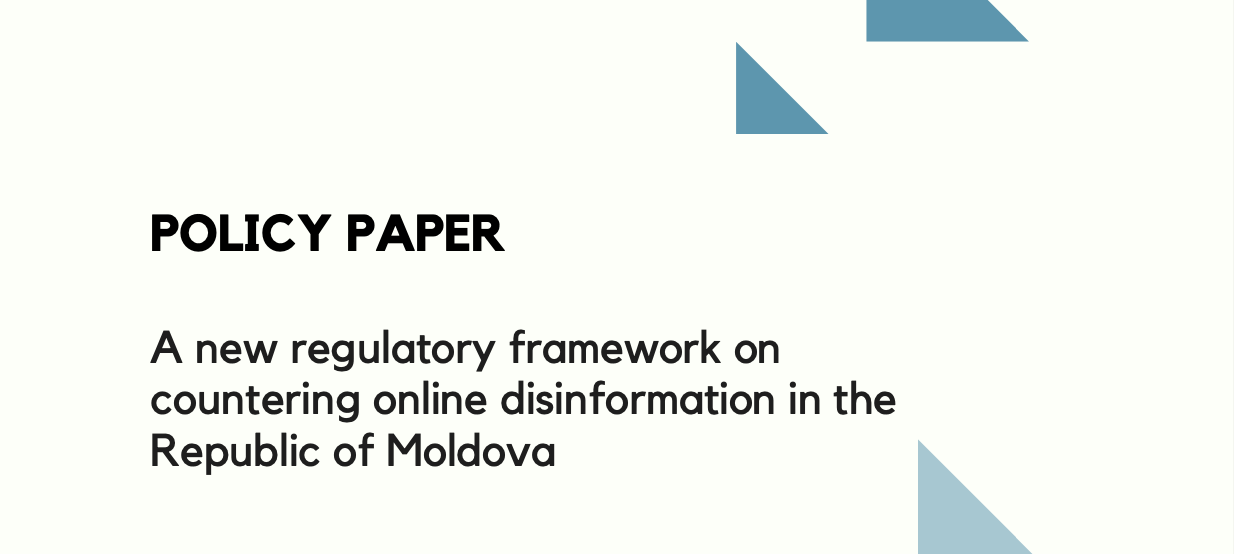Moldova needs clear and compliant policies to counter online disinformation

The Institute for European Policies and Reforms (IPRE), in partnership with the Berlin-based Institute for European Politics (IEP) (Institut für Europäische Polik) and the Institute for Strategic Initiatives (IPIS), prepared a Policy Paper that assesses and propose a series of policy recommendations for a new regulatory framework on countering online disinformation in the Republic of Moldova.
Over the past few months, IPRE held a series of public policy debates with participation of representatives of civil society, members of parliament, public authorities, national and international experts. One of the main conclusions of the policy debates is that there is an increased need of a new and clear regulatory framework to counter online disinformation threatening national security. In addition, most civil society actors consider that the main emphasis should be placed on actions to prevent disinformation by monitoring the online space and ensuring a coordinated effort at national level for strategic communication. In this regard, this role could be performed by a public authority operating according to the model of a Strategic Communication Center. This authority should be empowered with functions and tools to prevent disinformation, rapid response and strategic communication. At the same time, it is recommended to establisha mechanism to prevent and combat disinformation at national level through enhanced cooperation with large tech companies (e.g. META, YouTube, Telegram, etc.).
The Policy Paper suggests the following key policy recommendations for the next steps in desigining new policies on contracting online disinformation:
- A need for an exhaustive determination of the field of competence to be covered by a possible public authority with functions to prevent disinformation and protection of the information space;
- Ensure the correlation of the new normative provisions with the provisions of the Code of Audiovisual Media Services of the Republic of Moldova no. 174/2018, especially those inserted by Law no. 143/2018 for the amendment of the Code of Audiovisual Media Services of the Republic of Moldova, which aimed to counter disinformation in the audiovisual field, also defining disinformation in this respect;
- Consider providing for a sanctioning mechanism depending on the seriousness of the deeds, focusing also on countering the disinformation activities against national security, public and constitutional order. While ensuring that the sanctioning process provided by the law includes transparency and monitoring tools for solid guarantees to prevent abuses or violation of human rights;
- Establish a national authority with the primary role of preventing disinformation and securing the online information space following the model of a Center for Strategic Communication;
- Providing for an effective budget and motivating salary system for future employees of the future public authority to be created at national level;
- Government has to assign to a central specialized body (Ministry) responsible for developing policies in the field of mass-media, including preventing and combating disinformation;
- Ensure a clear delimitation of competences between the Government, ministries, the competent public authority in the field of prevention of disinformation and protection of the information space, as well as other public institutions;
- Introduce regulations on preventing and combating disinformation on online social media platforms, which would provide for:
i) clearly establishing in the national legislation the cooperation with national authorities and accountability of big tech companies in the Republic of Moldova to prevent disinformation in the online environment;
ii) appointment by big tech companies of clear contact points with the authorities of the Republic of Moldova,
iii) recruiting within the tech companies of content moderators in Romanian and Russian language to monitor the content in the information space of the Republic of Moldova and to prevent disinformation activities;
iv) establishing the obligation of periodic reporting on the activity of monitoring and moderating the activity on social platforms.
For more details, see the Policy Paper available in Romanian language here and English language here.
This publication was produced within the framework of the reformMD project, implemented by the Berlin Institute for European Politics (IEP) (Institut für Europäische Politik) in partnership with the Institute for European Policies and Reforms (IPRE) and the Institute for Strategic Initiatives (IPIS), with the support of the German Federal Foreign Office. The opinions expressed in the document belong to the authors.

